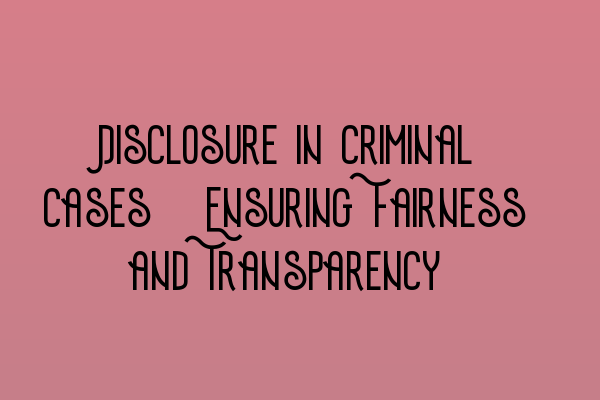Disclosure in Criminal Cases: Ensuring Fairness and Transparency
In criminal cases, the principle of disclosure plays a crucial role in ensuring fairness, transparency, and the protection of the accused. Disclosure refers to the duty of the prosecution to provide the defense with all relevant evidence, both incriminating and exculpatory, that it intends to rely on during the trial. This process allows the defense to properly prepare their case, challenge the prosecution’s evidence, and present a robust defense on behalf of their client.
However, the responsibility of disclosure extends beyond the prosecution alone. The defense also has an obligation to disclose to the prosecution any evidence that may be helpful to the prosecution’s case. This reciprocal duty ensures that both sides have access to all relevant information necessary to ensure a fair trial.
The Importance of Fairness and Transparency
Fairness and transparency are fundamental principles of the criminal justice system. They are essential to ensuring that the accused receives a fair trial and that the truth can be ascertained. By providing full disclosure to the defense, the prosecution promotes transparency in the proceedings and allows the defense to challenge the evidence effectively.
Disclosure also helps to prevent potential miscarriages of justice. If crucial evidence is withheld from the defense, it may result in an unfair trial and a wrongful conviction. By ensuring that all relevant evidence is disclosed, the court can make informed decisions and reach a just and reliable verdict.
The Challenges of Disclosure
While disclosure is essential for a fair trial, it can present challenges in practice. The sheer volume of electronic and physical evidence in many cases can make the process time-consuming and complex. Additionally, issues such as legal privilege, national security concerns, or the protection of vulnerable witnesses may impact the disclosure process.
Efficient and systematic disclosure procedures are crucial to address these challenges effectively. Digital solutions, such as e-disclosure platforms, can streamline the process, making it easier for both the prosecution and defense to manage and review the evidence. Embracing technology can improve the efficiency of disclosure, reducing delays and ensuring that justice is served in a timely manner.
The Role of Solicitors in Ensuring Disclosure
Solicitors play a pivotal role in ensuring effective disclosure in criminal cases. As legal professionals, they have a duty to advise their clients on the disclosure obligations and assist them in navigating the complexities of the process. Solicitors must carefully review the evidence provided by the prosecution, identify any undisclosed material, and request disclosure where necessary.
Furthermore, solicitors are responsible for conducting a thorough review of the evidence disclosed by the prosecution. This review involves analyzing the strengths and weaknesses of the prosecution’s case, identifying potential issues with the evidence, and assessing its admissibility. By scrutinizing the evidence, solicitors can build a strong defense strategy and challenge the prosecution’s case effectively.
It is imperative for solicitors to stay up-to-date with the latest developments in disclosure practices and procedures. By attending relevant training courses, such as the SQE 1 Practice Exam Questions and SQE 1 Practice Mocks FLK1 FLK2, solicitors can enhance their knowledge and skills in handling disclosure issues. Continued professional development ensures that solicitors are equipped to provide the best legal representation to their clients.
Looking Ahead: The Future of Disclosure
The criminal justice system is constantly evolving, and disclosure practices must adapt to keep pace with changes. The forthcoming implementation of the Solicitors Qualifying Examination (SQE) further underscores the importance of staying abreast of current developments in criminal law and practice.
Law firms and solicitors can benefit from comprehensive SQE 2 Preparation Courses and SQE 1 Preparation Courses to expand their understanding of criminal law, procedural requirements, and disclosure obligations. By investing in professional development and acquiring specialized knowledge, solicitors can offer their clients the highest level of expertise and guidance.
Conclusion
Disclosure in criminal cases is a vital aspect of ensuring fairness, transparency, and the protection of the accused. Solicitors play a crucial role in navigating the complexities of disclosure, advocating for their clients, and safeguarding the integrity of the criminal justice system.
By staying informed, attending relevant training, such as the SQE 1 Practice Exam Questions and SQE 1 Practice Mocks FLK1 FLK2, and embracing digital solutions, solicitors can effectively handle disclosure issues and contribute to the pursuit of justice. Fair trials, built on the principles of fairness and transparency, are the cornerstone of a just society.
For more information about the Solicitors Qualifying Examination (SQE) and important dates, please visit the SRA SQE Exam Dates page.
